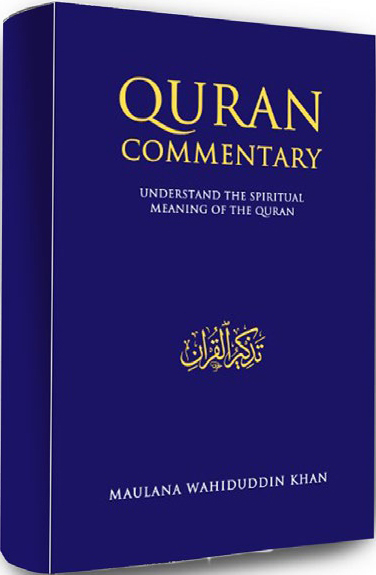THE WORD OF GOD
From The Scriptures
 THE Quran is the book of God. It has been preserved in its entirety since its revelation to the Prophet of Islam between 610 and 632 A.D. It is a book that brings glad tidings to mankind, along with divine admonition, and stresses the importance of man’s discovery of the Truth on a spiritual and intellectual level.
THE Quran is the book of God. It has been preserved in its entirety since its revelation to the Prophet of Islam between 610 and 632 A.D. It is a book that brings glad tidings to mankind, along with divine admonition, and stresses the importance of man’s discovery of the Truth on a spiritual and intellectual level.
Translated from Arabic and commentary
by Maulana Wahiduddin Khan
The pilgrimage is in the appointed months. Whoever intends to perform it during them must abstain from indecent speech, from all wicked conduct, and from quarrelling while on the pilgrimage. Whatever good you may do, God is aware of it. Make provision for yourselves — but surely, the best of all provision is God-consciousness. Always be mindful of Me, you that are endowed with understanding. (2: 197)
You will be committing no sin if (during the pilgrimage) you seek to obtain any bounty from your Lord. When you return from Arafat, remember God at the sacred place, and remember Him as He has guided you. Before this you were surely astray. Then press on from where the pilgrims stream forth and ask God’s forgiveness. God is ever forgiving and most merciful. (2: 198 -199)
When you have performed the acts of worship prescribed for you, celebrate the praises of God as you celebrated the praises of your fathers, or even more fervently than that. There are some who say, ‘Our Lord, give us abundance in this world.’ These shall have no share in the world to come. (2: 200)
Fear of God is the basic element of worship. As long as one remains in this frame of mind, it does not matter if the order of a rite is changed by mistake in performing the rites of pilgrimage, or if one attends to some private business while in the holy land. What is important is that one should enter into the spirit of pilgrimage—fear of God, remembrance of Him, prayerfulness, thanksgiving and wholehearted submission to God. While on pilgrimage, one should make sure not to do anything which runs counter to this spirit. There should be no feeling of superiority over fellow pilgrims, that is, one should ‘press on from where the pilgrims stream forth.’
Making too much of one’s forefathers and praising their great deeds is also against the spirit of pilgrimage. Pilgrimage is for the glory of God, not for praise of the self. What place can such attitudes and activities have in Haj, the very lesson of which is the equality of man before one, supreme God? If one does not learn this lesson during the pilgrimage, what chance is there of one applying it throughout the rest of one’s life?
But there are others who pray, ‘Our Lord, grant us good in this world as well as good in the world to come, and protect us from the torment of the Fire.’ (2: 201)
Prayers, especially those offered during the pilgrimage, are an outward manifestation of an inward state. Whatever one cherishes in one’s heart, one expresses in prayer. One who has set his mind on worldly riches and grandeur will concentrate on little else when he prays to God, whereas one who seeks the next world, with its infinite happiness and blessings, will make this the central theme of his devotions.
This prayer on the part of the believer is not a request for worldly riches. Material gain and worldly wealth are only parts of a ‘test paper’. And no one would like to pray to increase the difficulty of his ‘test paper’. This prayer is more like asking God to give him what is best for man in the eyes of God in this world and what is best for man in the eyes of God in the Hereafter.
Therefore, the best prayer for man is to say to his Lord, ‘O my God, give me in this world whatever You see is good for this world, and give me in the next life whatever You see is good for that world and save me from eternal doom.’
They shall have a good share from what they have earned. God is swift in His reckoning. Remember God during the appointed days; for one who hastens to leave in two days, it shall be no sin; and for one who stays on, it shall be no sin for him either. This is for one who fears God. Have fear of God, and know that you shall all be gathered before Him. (2: 202 – 203)
‘You shall be gathered before Him’ is the greatest lesson of pilgrimage, given in the plain of Arafat where millions of pilgrims gather annually.
This gathering symbolizes the final gathering of all human beings on Doomsday. Practical results are always produced by actions, not by words.





